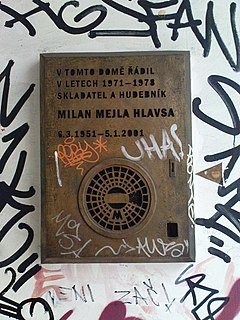Related Research Articles

Jiří Mucha was a Czech journalist, writer, screenwriter, author of autobiographical novels and studies of the works of his father, the painter Alphonse Mucha.

Jiří Menzel was a Czech film director, theatre director, actor, and screenwriter. His films often combine a humanistic view of the world with sarcasm and provocative cinematography. Some of these films are adapted from works by Czech writers such as Bohumil Hrabal and Vladislav Vančura.

Charter 77 was an informal civic initiative in the Czechoslovak Socialist Republic from 1976 to 1992, named after the document Charter 77 from January 1977. Founding members and architects were Jiří Němec, Václav Benda, Ladislav Hejdánek, Václav Havel, Jan Patočka, Zdeněk Mlynář, Jiří Hájek, Martin Palouš, Pavel Kohout, and Ladislav Lis. Spreading the text of the document was considered a political crime by the Czechoslovak government. After the 1989 Velvet Revolution, many of the members of the initiative played important roles in Czech and Slovak politics.

Josef Škvorecký was a Czech-Canadian writer and publisher. He spent half of his life in Canada, publishing and supporting banned Czech literature during the communist era. Škvorecký was awarded the Neustadt International Prize for Literature in 1980. He and his wife were long-time supporters of Czech dissident writers before the fall of communism in that country. Škvorecký's fiction deals with several themes: the horrors of totalitarianism and repression, the expatriate experience, and the miracle of jazz.
Jan Zábrana was a Czech writer and translator.

Jiří Hájek was a Czech politician and diplomat. Together with Václav Havel, Zdeněk Mlynář, and Pavel Kohout, Hájek was one of the founding members and architects of Charter 77.

Největší Čech is the Czech spin-off of the BBC Greatest Britons show; a television poll of the populace to name the greatest Czech in history. The series was broadcast by the national public-service broadcaster, Czech Television. The presenter of the programme was Marek Eben, who was also nominated to be in the Top 100; however, since he was presenting the show he was not eligible to be included in the final list.
Michael Wilson was an American screenwriter.

Jiří Bartoška is a Czech theatre, television, and film actor and president of the Karlovy Vary International Film Festival. His most notable film roles include performances in Sekal Has to Die (1998), All My Loved Ones (1999), and Tiger Theory (2016), as well as the television series Sanitka (1984) and Neviditelní (2014).

Philip Ives Dunne was a Hollywood screenwriter, film director and producer, who worked prolifically from 1932 until 1965. He spent the majority of his career at 20th Century Fox. He crafted well regarded romantic and historical dramas, usually adapted from another medium. Dunne was a leading Screen Writers Guild organizer and was politically active during the "Hollywood Blacklist" episode of the 1940s–1950s. He is best known for the films How Green Was My Valley (1941), The Ghost and Mrs. Muir (1947), The Robe (1953) and The Agony and the Ecstasy (1965).

Jiří KolářCzech pronunciation (help·info) was a Czech poet, writer, painter and translator. His work included both literary and visual art.

Arnošt Lustig was a renowned Czech Jewish author of novels, short stories, plays, and screenplays whose works have often involved the Holocaust.

Jiří Gruša was a Czech poet, novelist, translator, diplomat and politician.

Milan "Mejla" Hlavsa was the founder, chief songwriter, and original bassist of the Czech band the Plastic People of the Universe, which was part of the inspiration for the anti-establishment movement Charter 77.

Pavel Landovský, nicknamed Lanďák, was a Czech actor, playwright, and director. He was a prominent dissident under the communist regime of former Czechoslovakia.
Milena Jelinek was a Czech American screenwriter, playwright and teacher. She wrote the screenplay for the film Forgotten Light, which was awarded three Czech Lions in 1997. Her name is associated with the golden generation of Czech filmmakers, known as Czech New Wave. She was married to the late researcher Frederick Jelinek.

Jiří Weiss was a Czech film director, screenwriter, writer, playwright and pedagogue.

Michael Žantovský is a Czech diplomat, politician, author, journalist, lyricist and psychologist. He is a former Ambassador of the Czech Republic to the United Kingdom, as well as to Israel and the United States.

Jaroslav Kořán was a Czech translator, writer, screenwriter, and politician. A dissident and signatory of Charter 77 during Czechoslovakia's Communist era, Kořán translated over seven dozen books, mostly by American writers, from English into Czech, including major works by Kurt Vonnegut, Henry Miller, Roald Dahl, Ken Kesey, Charles Bukowski, John Kennedy Toole, and John Wyndham.

Signum Laudis is a 1980 Czechoslovak war drama film directed by Martin Hollý. It is set during World War I.
References
- 1 2 "Jiří Křižan". Filmový přehled (in Czech).
- ↑ "Czech scribe Jiri Krizan dies". Variety.
- ↑ "Jiri Krizan, Czech Dissident and Screenwriter, Dies at 68". New York Times.